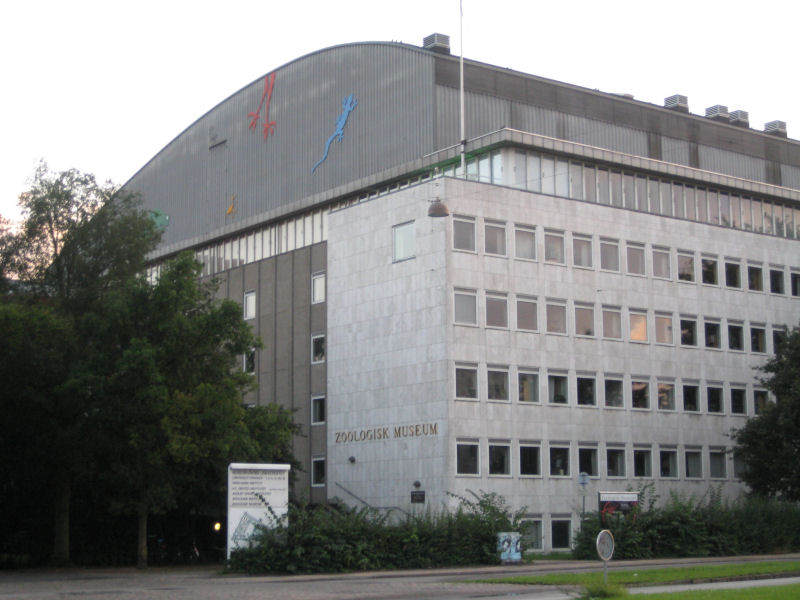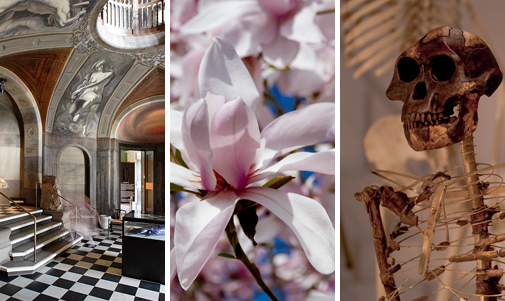
Museum of zoology
At the Zoological Museum will be researched, but there are also taught and exhibited to describe Earth's wildlife.
Zoological Museum has today 10 million animals in their collection, representing up to 10% of the Earth's known wildlife. In the permanent exhibitions you can among other things experience the great mammoth and the huge whale skeletons, and in their highly acclaimed special exhibitions are the latest knowledge made alive. In collaboration with the Department of Biology at the University of Copenhagen participates Zoological Museum in the teaching of undergraduate and graduate students.
About the Zoological Museum
Zoological Museum is part of the Natural History Museum, University of Copenhagen.
Our exhibition department is responsible for the permanent and temporary exhibitions, where you can learn something about how wildlife is changing, if you travel from the North Pole to the South Pole, life in Denmark after the Ice Age, and the animals that live in the oceans.
Zoological Museum has large collections of multicellular animals used in many different research projects worldwide. This research is organized around three scientific disciplines: vertebrates and kvartærzoologi; entomology (spiders, myriapoder and insects); and other invertebrates. The museum's scientific staff participates in teaching at a number of specialized courses at the university and as supervisors on various projects.
In cooperation with the other departments at the University of Copenhagen attending the Natural History Museum in the teaching of undergraduate and master's and PhD students.
Bachelor and Master students
The museum's scientific staff also act as mentors for bachelor and master students. You can look at the list of project (bachelor and theses). If you have other ideas, please feel free to contact one of our faculty members for more information.
The PhD program
The Natural History Museum has a long history of educating graduate student, preferably in cooperation with other Danish and foreign educational and research institutions. Contact a scientific employee in the relevant research if you want to know more about how to make all or part of your PhD project at the Natural History Museum.
Tuition at the Natural History Museum
The Natural History Museum is responsible for several courses in biology and geology, and our researchers participate in teaching at the Institute of Biology, Department of Geography and Geology and the Niels Bohr Institute. The Natural History Museum is also developing a new general course in life's origin and evolution. This course will probably be offered for the first time in block 2, 2009.
botany
Botanical Gardens dominant field of research is plant systematics, including studies of slægskabsforhold (phylogeny) and speciation and hybridization. In addition, there eg research in biogeography and in tissue culture for conservation of endangered species.
The teaching in the Botanical Gardens is primarily related to the current research fields (eg. The course Phylogenetic and molecular methods), but contributing also to the Institute of Biology teaching. Both research and teaching is based on the extensive collections of preserved and live plants, often supplemented by fieldwork. The museum and garden faculty members act as supervisors at all levels and has access to virtually all modern research facilities.
Zoology
Zoological Museum's research field is animal systematics, describing species and investigating their relationship (phylogeny) at all levels, from populations to the entire animal kingdom.
Tuition at the Zoological Museum relates naturally to this broad field of research, but also include more general topics such as biogeography, kvartærzoologi, speciation and conservation. Many thesis topics will be involved in connection with the phylogenetic studies, ranging from biometrics, studies of animal sounds, and reproductive biology to the study of ultrastructure, gene sequences and embryology using scanning and transmission electron microscopy and immunocytochemistry with confocal scanning microscopy. The data obtained are analyzed using advanced statistical models.
Many studies based on the museum's collections, but the new material is collected continuously, both to increase the general coverage of animal groups, which is a research focus, and for research use, the material must be treated in special ways to be studied. There is a tradition of field work in connection with specialties, both domestic and foreign in various of the museum's research projects.
The museum coees also acts to some extent as supervisors of projects that take place at other university departments and internal supervisors for projects based outside the university.
Geology
Geological Museum presently offering courses in solar system and in paleontology. The museum's research fields ranging from the Solar system, the early Earth, the origin of life and development, climate research, mineralogy and petrology. The research is partly based on studies in the museum's extensive collections of geological objects, partly on data collected during the field work and several different remote sensing techniques.
Geological Museum has several laboratories with an electron microscope and advanced mass spectrometers and has the option to use the other laboratories in Geocenter Denmark, which the Geological Museum is part of.
There are plenty of opportunities to make bachelor, master and doctoral projects at the Geological Museum. If you are interested please contact one of our scientists or Henning Haack to hear about the possibilities.
Address
Universitetsparken 15
2100 København Ø .
Contact info
Telefon: 3532 2222
E-mail: snm@snm.ku.dk
Opening Hours
Tirsdag - Søndag
kl. 10.00 - 17.00
Website





